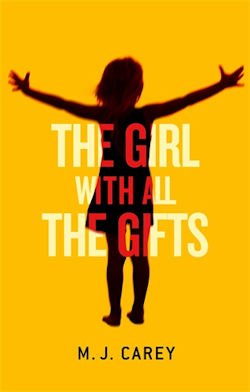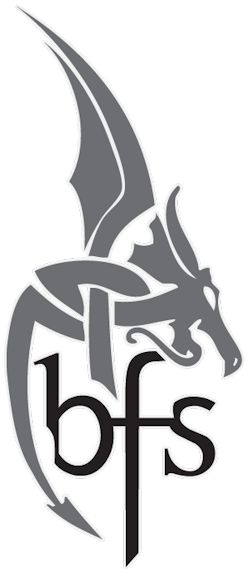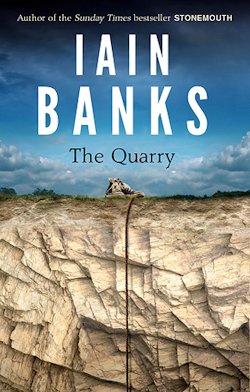Welcome back to the British Genre Fiction Focus, Tor.com’s regular roundup of book news from the United Kingdom’s thriving speculative fiction industry.
Not for the first time, but perhaps, alas, the last, we lead this week with an item regarding Iain Banks, whose final interview proved as powerful and powerfully funny as anything else from the mind of the late great.
Relatedly, there was anger from certain independent booksellers at the deep discounting of Banks’ new novel, The Quarry. Was Amazon and Sainsbury’s behaviour a timely tribute, scandalous profiteering, or something between these extremes?
Later on, we’ll look at the cover and blurb of “the book that everyone will be talking about in 2014” in Cover Art Corner, before closing out with news of the nominees for this year’s British Fantasy Awards.
The Final Interview with Iain Banks
It was with a heavy heart that we bade goodbye to Iain Banks ten days ago, but with his final novel ahead of us yet, in my heart of hearts I had hoped to hear something more of the man before closing the door. On Saturday, I did.
Banks’ expansive interview with Stuart Kelly represents his last public statement—a tragic fact, looking back, that the author was almost cognisant of. That said, he had not stopped planning, and at the outset of the article, Kelly reflects on the particular wickedness of this:
“The plans and hopes he had capture his quicksilver, optimistic personality, regardless of what transpired. To be robbed of 30 years he thought he might have had is one thing: to lose the few months he was cautiously anticipating seems especially cruel.”
Banks goes on to talk about… oh, all the subjects under the sun! He touches on Doctor Who and the death of Margaret Thatcher; he identifies the novels he is most and least proud of, respectively The Bridge and Canal Dreams; he discusses how he enjoyed writing SF more than any of his literary fiction; and that’s hardly the half of it.
He even takes a little time to talk about The Quarry, his new novel, about which he is unsurprisingly honest:
“It’s a fairly simple book. [There aren’t] many characters, there’s only really one location and it doesn’t muck around with flashbacks or narrative order.” He adds: “If I’d known it was going to be my last book, I’d have been quite disappointed that I’m going out with a relatively minor piece; whereas something like Transition, a wild splurge of fantasy, sci-fi and mad reality frothed up together… now that would have been the kind of book to go out on. I’m still very proud of The Quarry but… let’s face it; in the end the real best way to sign off would have been with a great big rollicking Culture novel.”
He signs off, finally, in the most magnificent manner imaginable. Never mind all this nonsense about gall bladder cancer, Banks concludes that he was actually killed by a cosmic ray.
“I won’t brook any contradiction; it was a high-energy particle. A star exploded hundreds or thousands of years ago and ever since there’s been a cosmic ray—a bad-magic bullet with my name on it, to quote Ken [McLeod]—heading towards the moment where it hit one of my cells and mutated it. That’s an SF author’s way to bow out; none of this banal transcription error stuff.”
Have I said already how much I miss this man?
A Deep Discount for The Quarry
Banks’ new novel made the news for another, related reason this week. Last Wednesday, you see, both Amazon.co.uk and the website of the supermarket Sainsbury’s had dropped the pre-order price of a hardcover copy of The Quarry from its RRP of £18.99 to just £3.99, which I doubt even covers the cost of producing the book.
Naturally, a number of independent retailers were angered by this, as The Bookseller reports:
Nic Bottomley, owner of Mr B’s Emporium of Reading Delights in Bath, had criticised the dramatic price reduction as a “brazen” move. He said: “I think that is just cynical. I think it is cynical, but you could say predictable. If anything, I think if Amazon gets some bad press from it, it might encourage more customers to buy it from us because of how it looks. It is cashing in on a recently deceased, well-loved author and I think there some customers who would be put off that.”
Sheila O’Reilly, owner of Dulwich Books in London, described the move as “amazing” and “breathtaking.” She said: “There is just no way anyone can compete with that price. They have got to be selling them as a loss-leader.” Keith Smith, owner of Warwick and Kenilworth bookshops, said supermarkets and Amazon sell books for less than the price they buy them for to encourage people to shop at their stores. He said: “If I could sell it at £3.99 I would do very well with it. Amazon can afford to sell it at a loss because they don’t pay enough tax in the UK. It is scandalous.”
Is it?

I’m… not so sure. Notwithstanding Smith’s comments about Amazon’s tax practices—which I agree are absolutely abhorrent—anything that gets The Quarry into the hands of the most people possible is kind of alright by me, and so what if a few independent booksellers lose this one opportunity to make a profit? I know they’re struggling, but let’s face it: no-one’s future was going to be secured because of this book.
Yes, this was very probably a loss leader, and yes, it’s entirely likely to have encouraged a few customers to order something else from Amazon.co.uk or Sainsbury’s, but who’s to say these decisions weren’t made for decent reasons, equally?
In any case, the very next day, prices on both sites returned to normal, and a spokesperson for Sainbury’s dismissed their deep discounting of The Quarry as simple human error, saying that “this mistake has now been rectified and we apologise for any confusion it may have caused.”
I don’t know whether it’s me or my cynical side speaking here, but I don’t believe Sainsbury’s statement for a second. At least Amazon had the sense to not offer a comment of any sort, because as sure as sunrise, they knew what they were doing. And I’m not quite convinced that what they did was such a dreadful thing. Are you?
Cover Art Corner: The Girl With All the Gifts

Moving on, Orbit Books recently revealed the cover art for “the book that everyone will be talking about in 2014,” namely The Girl With All the Gifts by M. J. Carey.
M. J. Carey, you say? Why, that must be none other than an ever-so-slight pseudonym for Mr Mike Carey, author of the five Felix Castor novels and this year’s The City of Silk and Steel.
Admittedly, the cover is somewhat non-descript, but the blurb is leaps and bounds better. Creepy, even:
Melanie is a very special girl. Dr Caldwell calls her “our little genius.”
Every morning, Melanie waits in her cell to be collected for class. When they come for her, Sergeant keeps his gun pointing at her while two of his people strap her into the wheelchair. She thinks they don’t like her. She jokes that she won’t bite, but they don’t laugh.
Melanie loves school. She loves learning about spelling and sums and the world outside the classroom and the children’s cells. She tells her favourite teacher all the things she’ll do when she grows up. Melanie doesn’t know why this makes Miss Justineau look sad…
Most of my experience of Mike Carey’s writing comes courtesy of a few phenomenal comic books—Hellblazer, Lucifer and The Unwritten especially—but I consider myself a big fan of the fellow in any event. To wit, I’m keen to see why everyone seems so excited about this book.
Except to say sometime next year, Orbit stopped short of providing a provisional release date as part of their announcement of The Girl With All the Gifts, but I asked Amazon, and their listings lead me to believe that Carey’s new novel will be published worldwide in either January or March 2014.
I’m sure we’ll talk about it again before then…
The British Fantasy Awards Shortlist

Last for today, but very far from least indeed, the nominees for the 2013 British Fantasy Awards were announced on Monday. You can see a complete list of the many and various contenders in all thirteen categories on the British Fantasy Society’s site, but I wanted to acknowledge the big-hitters here.
Before we dig any deeper into this, let’s remind ourselves of the nomination process:
Four nominees in each category were decided by a vote of the members of the British Fantasy Society and the attendees of FantasyCon 2012, with up to two further nominees in each category being added by the juries as “egregious omissions.”
And now—drumroll, please—the shortlist:
Best Fantasy Novel (the Robert Holdstock Award)
- Blood and Feathers, Lou Morgan (Solaris)
- The Brides of Rollrock Island, Margo Lanagan (David Fickling Books)
- Railsea, China Miéville (Macmillan)
- Red Country, Joe Abercrombie (Gollancz)
- Some Kind of Fairy Tale, Graham Joyce (Gollancz)
Best Horror Novel (the August Derleth Award)
- The Drowning Girl, Caitlin R. Kiernan (Roc)
- The Kind Folk, Ramsey Campbell (PS Publishing)
- Last Days, Adam Nevill (Macmillan)
- Silent Voices, Gary McMahon (Solaris)
- Some Kind of Fairy Tale, Graham Joyce (Gollancz)
Best Novella
- “Curaré,” Michael Moorcock (Zenith Lives!) (Obverse Books)
- “Eyepennies,” Mike O’Driscoll (TTA Press)
- “The Nine Deaths of Dr Valentine,” John Llewellyn Probert (Spectral Press)
- “The Respectable Face of Tyranny,” Gary Fry (Spectral Press)
Best Short Story
- “Our Island,” Ralph Robert Moore (Where Are We Going?) (Eibonvale Press)
- “Shark! Shark!” Ray Cluley (Black Static #29) (TTA Press)
- “Sunshine,” Nina Allan (Black Static #29) (TTA Press)
- “Wish for a Gun,” Sam Sykes (A Town Called Pandemonium) (Jurassic London)
Best Collection
- From Hell to Eternity, Thana Niveau (Gray Friar Press)
- Remember Why You Fear Me, Robert Shearman (ChiZine Publications)
- Where Furnaces Burn, Joel Lane (PS Publishing)
- The Woman Who Married a Cloud, Jonathan Carroll (Subterannean Press)
Best Anthology
- A Town Called Pandemonium, Anne C. Perry and Jared Shurin (eds.) (Jurassic London)
- Magic: an Anthology of the Esoteric and Arcane, Jonathan Oliver (ed.) (Solaris)
- The Mammoth Book of Ghost Stories by Women, Marie O’Regan (ed.) (Robinson)
- Terror Tales of the Cotswolds, Paul Finch (ed.) (Gray Friar Press)
I’ve read the vast majority of the nominated novels and anthologies, as well as several of the short stories and one collection, so I’m suddenly feeling pretty decent about my reading outside of science fiction this past year. That said, I’ll have to grab a couple of those collections and that issue of Black Static, as well as investigating Spectral Press.
Will you be buying anything because of the shortlist?
Another observation before I say good day: excepting the award for Best Novella, female authors have been nominated in every major category. That isn’t to say the British Fantasy Society’s representation of gender in the genre is in any way ideal, but to be perfectly honest, it’s more balanced than I was expecting given the prevalent problems we’ve talked about in earlier editions of the British Genre Fiction Focus.
In any event, we have plenty of time to talk this through and perhaps catch up on a couple of contenders before all is said and done, because the winners of the British Fantasy Awards won’t be announced till early November.
Of more immediate interest, though I still don’t have a definitive date for the new-fangled new releases feature, my fingers are firmly crossed that you’ll see something from the aforementioned fold come Sunday—so keep your eyes peeled, please!
But that’s it for the British Genre Fiction Focus this week. As ever, I’d urge you to continue the conversation in the comments, and remember to check in again next Wednesday for another regular round-up of news from bookish Blighty.
Niall Alexander is an erstwhile English teacher who reads and writes about all things weird and wonderful for The Speculative Scotsman, Strange Horizons, and Tor.com, where he contributes a weekly column concerned with news and new releases in the UK called the British Genre Fiction Focus, and co-curates the Short Fiction Spotlight. On occasion he’s been seen to tweet, twoo.










